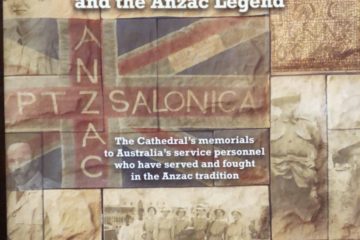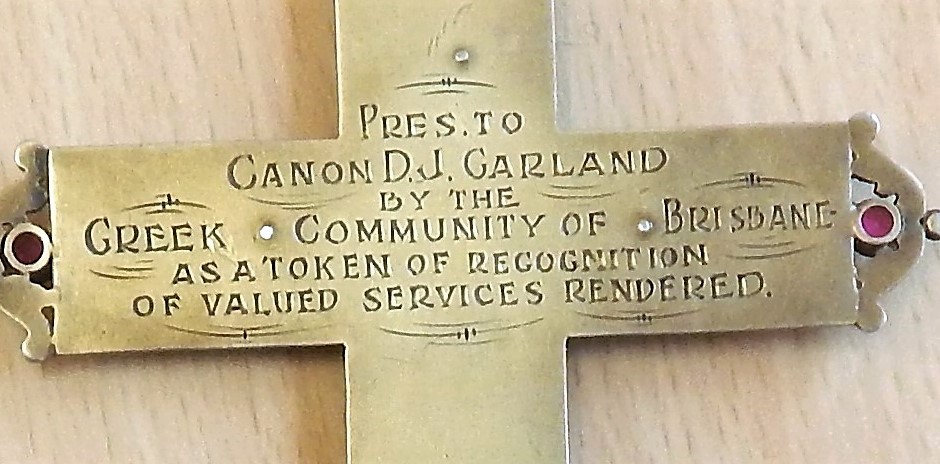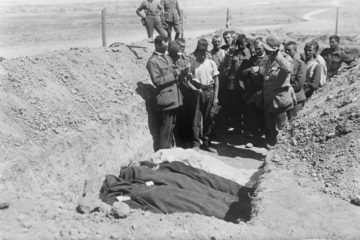Church on the frontline
ABOVE: A humorous take on what would have been a terrifying event, this cartoon appeared on the front page
of the August 1917 issue the Church of England’s “The Church Army Review”. The caption read: “A Church Army
Recreation Hut demolished by Shell-Fire”.
AT THE FRONT.
THE WORK OF THE CHURCH.
LECTURE BY CANON GARLAND.
Many old friends of the Rev. Canon Garland [ David John Garland ] assembled at the Churchmen’s luncheon this week to renew their acquaintance with this one-time familiar and prominent churchman in Western Australia, and at the same time hear him lecture on the church work at the Front.
Clad as a military chaplain, the Canon gave evidence of undoubted vigour and enthusiasm, as well as displaying a full knowledge of his subject, notwithstanding the lapse of time, as indicated by the change in colour of hair and beard.
The Lieutenant-Governor (Sir E.A. Stone) [ Edward Albert Stone ] welcomed the reverend gentleman in well-chosen remarks on his previous work in this State, and congratulated him on the energy displayed in everything which he undertook.
The remarks found a ready response in the acclamation with which the visitor was received upon rising to commence his lecture.
Canon Garland thanked Sir Edward for his remarks, and said he could not but be deeply touched with the recollection that his work in the past had not been forgotten, and felt some reward in retaining some place in the affections of those present.
The sadness at leaving home was greatly soothed by the kindly reception of those present and the anticipation of being able to some work among the soldiers at the Front.
Another source of sadness, even greater than that of leaving home, was upon receiving the news that after rising to the very pinnacle of distinction and sacrifice, Australia was in danger of minimising or dimming her fame and place among the nations unless she could maintain that place by sending sufficient men to uphold what she had won by the blood spent at Gallipoli, Egypt, France, Mesopotamia, and that just recently at Gaza.
It was, he contended, appalling to see in the cabled news, or, rather, wireless news, some two or three lines about the war, and some twenty about the “Cup”.
[ Canon Garland said: ] “They had heard with deepest regret about the disaster to Italy, also Russia, although the latter had always been predicted. This made up a defeat from which it took six months to recover.
“One did not wish to touch upon the prerogatives of the politicians, or in any way to comment upon the issues laid down by the Prime Minister, but it was so difficult to speak of the war without touching upon politics, that one felt inclined to say in all earnestness a ‘plague upon politics’. One wrote ‘Win the war and hang politics’.
“Cannot each politician realise that conscription must be, without waiting for a vote to be taken?
“Our duty to those in the trenches, and more so to those who have made the great sacrifice, does away with the desire for a vote, and makes plain that it is not the time to wait for a referendum, but to get a vote through Parliament to get the fellows to the front who are now holding up verandah posts.
“It is the time to take the shortest road, and not the longest.
“The referendum is witness of the failure of voluntary enlistment. (“How about Western Australia?” was interjected.)
“In reply to that I say unhesitatingly that no State has done so well as Western Australia, and I am proud of my old association with a State that did so well, with the handsome vote for equality of service.
“And I hope that you will give the Prime Minister and his staff every assistance in getting the referendum to a successful issue.
“Surely we have seen enough – at least, I have – to bring the gravity of the war home.
“Then there is the question of raising funds for the boys at the Front without seeking some sort of profit or sensation in return.
“We should set our faces against it as a church. Our very honesty and honour should make people give to those who have given, and are still giving, so much for us, if we are to keep Australia in the proud position she holds.
“We cannot do it if her manhood remains here. Why? Because it has been the Mother Country which has kept Australia, and kept out the coloured races.
“True, we have Acts of Parliament to keep out the coloured races, but what are Acts, after all, without the force to back then up? Pieces of paper, and we know by the present war how the forces of the enemy regarded such pieces of paper.

ABOVE: A group of Australian soldiers standing outside a timber building which bears a banner reading: “Australian Military Church: Church of England”. The chapel
was part of the Australian Infantry Base Depot at Harfleur, France, which also contained an officers’ mess, canteens and recreation huts (out of view) to the left, further
down the road. Photo courtesy of the Australian War Memorial. Image No. C03266.
“However, I must get to my story of what the church is doing at the Front.
“The story, or, as it really is, a romance – a romance which may yet be written by one of the boys now at the Front after the war is over.
“Now, dealing with the work that the church has been, and is still doing at the Front it is not generally known that the church has one thousand huts at the Front, and very close to the Front as will be gathered when it is told that some have been blown to pieces by shellfire.
“These are used for all purposes and by all soldiers irrespective of any denomination.
“The Church Army is the organising body, and it cost £100 today for each hut, which, when purchased, has to be carried on. Those have been given by the church at home, and all their privileges are free to our Australian boys.
“Therefore, we can well turn to Australians for assistance to carry these on. Nothing is charged for to soldiers; everything is free – (“Cigarettes!” was interjected.) – even cigarettes.
“It is, perhaps, not known, but many can tell you that Buckingham Palace Hotel has been given over as a hospital, and the King has given over part of Buckingham Palace also for a hospital and purposes of rest, which is neither so that you will be what they sing of, ‘The Sunshine of Their Smile’.
“Once when they were singing this very song, grouped round the stove in the middle of one of these Church Huts, one boy came in, looking bad, covered with mud and slime, and could not speak.
“He was given a warm bath, and fed by his comrades and churchman in charge, and when he recovered his voice told how he had escaped the enemy and wandered about, not daring to approach friend or enemy, because he could not distinguish which were which, until he heard the voices of the singers and steered to the spot.
“It may help those who think they suffer at home to know that he had no boots, and what appeared on first sight to have been boots, was mud and slime frozen to his feet, which were in a dreadful state.
“But there are so many wounded and sick that this cannot be dwelt on except as an incident in the church work. Well, we gave him a pair of boots to get along to his regiment.
“A week after, a well set-up soldier came into the tent with a parcel.
“It was our boy bringing the boots back, but not the laces, which he begged to retain as a souvenir, because he considered the Church Hut had been the means of saving his life. Who can say?
“I am not going to tell or dwell on any more incidents, but will tell that it is not the Church of England alone.
“The same work is being done by the Roman Catholics, the Presbyterians,the Methodists, the Salvation Army, and others, including the Y.M.C.A. They (the Y.M.C.A.) are not the only ones. I do not wish in the slightest degree to take from or minimise the good work they are doing.
“I want you to realise that they are only one of seven or eight institutions which are doing good work. They have, however, shown us one thing, and that is how to advertise. All are doing good work, not one.
“The Church at home has expended £700,000, and I say that it was well spent, even if only to save that one mother’s son.
“It is not only the giving of hot coffee and cocoa, but the spiritual welfare, that is their object, as more than the commander will remind you, saying, ‘Padre, it keeps up the morale of the men’, though on one occasion, when an emergency required it, hot coffee was not only made, but taken right into the very firing line.
“Australia is now asked to help by providing £6,000, and I am confident that it will be provided.”
Proceeding, Canon Garland mentioned that, among other needs, they wanted – firstly, money for the local needs of the Australian boys in England; secondly, pay off and maintain the huts in France; thirdly, minister to the Australian boys wherever they were stationed; fourthly, give back to the Mother Church in England some of what she had already provided.
[ Canon Garland said: ] “In dealing with these items, it should be borne in mind that, no matter what religion, or State, or other factor, no boy ever entering any of the rooms or huts was asked for money, but made to feel that the provision, whatever it was, was his for the sharing, and his for the taking.
“The only thing that was pressed on him was the welcome – the welcome to soldiers of all denominations.”
Canon Moore had been in charge of the work in Western Australia, but as he was leaving for the front in a month’s time, the work would be carried on by the Rev. Riley [ Charles Lawrence Riley ], the son of Archbishop Riley [ Charles Owen Leaver Riley ].
He felt assured that the amount that Australia was asked to raise for the Church Huts, £6,000, would be forthcoming, and Western Australia would do her share as she always did.
Might he also express the hope that her lead at the last referendum would be the guide to the next one in December. (Applause.)
Canon McClemans [ William Joseph McClemans ] proposed a vote of thanks, which was seconded by the Hon. Chas. Sommers [ Charles Sommers ], in words which spoke well for the success of the appeal to be made for the huts.
[Canon Garland continued:] “…These huts are open day or night except for two hours, in which to do the necessary cleaning.
“Volunteer ladies give up their time for the attending and assisting the soldiers. What it means to the boys of Australia, after the fighting line rigours, to come across or meet with gentle and refined ladies, I leave, to your own good sense.
“Let me give you one contrast to this treatment at Crewe, when one big draft arrived. The Railway Company closed all refreshment rooms, and left them in the cold. (Cries of “Shame.”)
“Fifty thousand have passed through their hands, and are still passing through, of all denominations, and the one is made equally as welcome as the other.
“Another duty of the Church at Home, and by no means the lightest, is the shepherding (in the truest sense of the term) of the boys’ relations – that is organising the relatives of those boys who are wounded or sick in the hospitals, both in England and France.
“They are organised something after the style of ‘Cook’s’ tours, provided with conductors and interpreters, transported across the sea, and taken to the hospitals, where they can be at the bedsides of their sick or dying sons, brothers, or other relatives, and after wards brought back again.

ABOVE: Veterans of the Great War relaxing outside the Church of England Home for Soldiers at Coolangatta at Christmas. This photograph appeared on page 23 of “The Queenslander” newspaper on 22 January 1921. The successor to this facility, “The Garland”, a multi-storey, high-rise apartment complex, is presently under construction.
“The Church in Queensland, or as ‘we’ still love to call it, ‘the Church of England’ – (Applause.) – was the first to open a Rest House at the seaside for returned soldiers.
“Then another work for the Church is the problem of the returned soldier, and how he is to be provided for – not repatriation. (Stupid word! who would ever use it when once aware of its correct meaning?)
“They are only coming back to the country they left to defend. That is, alas! some of them. It is their coming back I say we have to provide for – looking upon them as our ‘boys’, our ‘relations’.
“Coming back with the shock off the hell they have been through, marring their outlook, aye, in many cases their mental efficiency, when they are not able to fit in with the life they led prior to going to the war, and must be led back gently, to former occupations, or else fresh occupations sought and they fitted for them.
“This is equally a matter for the Federal and State Governments to collaborate with the churches.
“Many may be disillusioned. It is indeed a problem for the best and thoughtful best at that.
“I was once connected with a great farm which the Church had in Essex. This has been handed over for the problem of the returned soldier, and consists of some 700 acres [ 283 hectares ], and is to be utilised in training returned men, who want to take up farming until they are fit for the work.
“We want to think of the problem of what is best for the men, the same as we should think of what is best for ourselves, and tackle it on those lines.
“One of the first and best of hospitals was sent by the Church, before the authorities could get their ambulance tents ready, and send them.
“We want to subscribe for these huts and send them near to the boys, and give them – not to sell – cigarettes.”
– from page 5 of Perth’s “The Daily News” of 16 November 1917.


